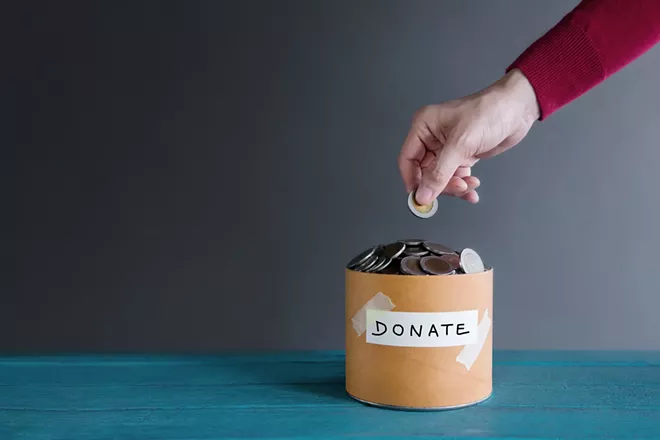The holiday season is also the giving season. Charities have been holding their year-end fundraisers, clothing drives and food drives. In our malls and our parks, we found Christmas trees whose ornaments offer opportunities to provide Christmas dinner or winter clothes for children. It's beautiful and encouraging to see so much generosity on prominent display.
It's also short term.
If you are lucky enough to be able to donate to a worthy cause, I'm going to suggest something that may sound counterintuitive: shift your giving toward change.
Let me start by admitting that I'm not saying anything original here. What I hope to offer is not a unique take, but a simple one: Charity is not a strategy for social change and cannot solve our community's problems.
Triage aid — what we often think of when we talk about charity — is when resources are offered to address an urgent crisis, such as children without coats, unhoused people without socks or gloves, or families without food over the holidays. That coat, pair of socks or food delivery can make a world of difference to the individuals who receive it. But when charity is framed as a complete strategy for healing a community, it can actually do more harm than good. Here's why:
Charity is often rooted in convenience. The appeal to "give until it hurts," which has gained popularity in the last few years, wouldn't be considered edgy or revolutionary if it didn't run counter to the common understanding that charity comes from personal excess. Instead of focusing on how we can effectively join with our neighbors to build a community that cares for everyone, the Charity Strategy tells us we can simply skim our social contribution off the top of our comfortable existence. "Here's a few spare bucks, hope that helps. My obligation to you is now complete." The Charity Strategy allows us to withdraw from our neighbors and mentally insulate ourselves from the struggles of others.
A change mindset embraces the discomfort of active empathy, which comes with uncomfortable conversations, demands personal growth and requires collaboration within community.
Charity assumes money can solve our problems. Charitable giving is often framed as a one-stop strategy for "doing your part." This mindset is reinforced when we're encouraged to "shop" for positive outcomes. "For only $25 you can fund a family's Christmas dinner!" "For $30 you can ensure three children have winter coats!" The immediate results are good, but triage charity doesn't touch the systems that led to underfed families or cold children. Triage aid stops the proverbial bleeding. It doesn't sew up the wound.
Money can't build solidarity between community members across economic classes. It can't write the policy needed to combat homelessness or food insecurity. It can't be the voice of everyday people in rooms often filled with corporate interests and privileged perspectives.
Many direct service organizations also have community outreach and public policy arms. What if instead of giving a larger percentage of our earnings once a year, we offered our time and skills to help with outreach and policy work throughout the year? A change mindset challenges us to ask ourselves how we can offer our time and talent to address the systems that create a need for charity.
Charity makes the middle and upper classes arbiters of worthiness, and forces the recipients of charity to prove they "deserve" help. Many (though not all) charities require lengthy applications to access their services, or they only offer services to people who meet very strict criteria. There are many complex reasons for this, some reasonable and practical, others arbitrary or unhelpful. Regardless, there are always going to be people who fall between the cracks of what resource gatekeepers consider "acceptable."
What would it mean for us to consider that lacking basic necessities is not a sign of personal failure?
Charity requires people — usually poorer people — to justify their needs and choices, while middle- and upper-class people, who are the majority of donors and charity administrators, decide if their justifications are adequate to receive help with basic necessities like food, heat, clothing and shelter. Very rarely do those of us on the giving side of the charity equation have to submit to that level of scrutiny of our daily lives.
What would it mean for us to consider that lacking basic necessities is not a sign of personal failure or untrustworthiness, and thus access to basic necessities should not be dependent on submitting to paternalistic supervision and scrutiny? What would it mean to embrace the idea that people who struggle do not need to wear that struggle on their sleeve, perform poverty in an acceptable way, or be paragons of good judgment and virtue (as someone else defines it) to be worthy of food, shelter and clothing? And what would it mean to view those who struggle as equals and as people we should partner with to build communities where everyone's needs are met?
Charity, as a stand-alone act, can make a positive difference in the lives of many individuals, but it is not a strategy for building a better community. To do that we have to invest in our neighbors year-round, in ways that aren't tax deductible. We have to build relationships, we have to leverage our skills, and we have to spend our time.
This coming year, let's start moving beyond charity to embrace a change mindset. ♦
Jac Archer (they/them/theirs) is a local activist, organizer for the Peace and Justice Action League of Spokane, and educator in the fields of diversity, equity, civic engagement and sexuality.

